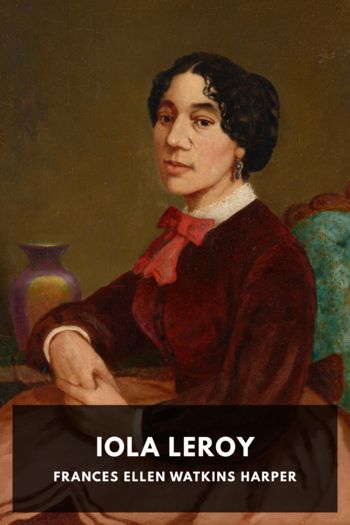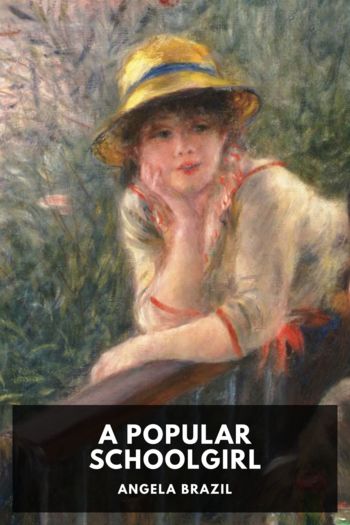Iola Leroy, Frances Ellen Watkins Harper [read aloud books .txt] 📗

- Author: Frances Ellen Watkins Harper
Book online «Iola Leroy, Frances Ellen Watkins Harper [read aloud books .txt] 📗». Author Frances Ellen Watkins Harper
“That may be true; but I wasn’t reasoned into it, and I do not expect to be reasoned out of it.”
“Will you accompany me North?”
“No; except to put you in an insane asylum. You are the greatest crank out,” said Lorraine, thoroughly disgusted.
“No, thank you; I’m all right. I expect to start North tomorrow. You had better come and go.”
“I would rather follow you to your grave,” replied Lorraine, hotly, while an expression of ineffable scorn passed over his cold, proud face.
X Shadows in the HomeOn the next morning after this conversation Leroy left for the North, to attend the commencement and witness the graduation of his ward. Arriving in Ohio, he immediately repaired to the academy and inquired for the principal. He was shown into the reception-room, and in a few moments the principal entered.
“Good morning,” said Leroy, rising and advancing towards him; “how is my ward this morning?”
“She is well, and has been expecting you. I am glad you came in time for the commencement. She stands among the foremost in her class.”
“I am glad to hear it. Will you send her this?” said Leroy, handing the principal a card. The principal took the card and immediately left the room.
Very soon Leroy heard a light step, and looking up he saw a radiantly beautiful woman approaching him.
“Good morning, Marie,” he said, greeting her cordially, and gazing upon her with unfeigned admiration. “You are looking very handsome this morning.”
“Do you think so?” she asked, smiling and blushing. “I am glad you are not disappointed; that you do not feel your money has been spent in vain.”
“Oh, no, what I have spent on your education has been the best investment I ever made.”
“I hope,” said Marie, “you may always find it so. But Mas—”
“Hush!” said Leroy, laying his hand playfully on her lips; “you are free. I don’t want the dialect of slavery to linger on your lips. You must not call me that name again.”
“Why not?”
“Because I have a nearer and dearer one by which I wish to be called.”
Leroy drew her nearer, and whispered in her ear a single word. She started, trembled with emotion, grew pale, and blushed painfully. An awkward silence ensued, when Leroy, pressing her hand, exclaimed: “This is the hand that plucked me from the grave, and I am going to retain it as mine; mine to guard with my care until death us do part.”
Leroy looked earnestly into her eyes, which fell beneath his ardent gaze. With admirable self-control, while a great joy was thrilling her heart, she bowed her beautiful head and softly repeated, “Until death us do part.”
Leroy knew Southern society too well to expect it to condone his offense against its social customs, or give the least recognition to his wife, however cultured, refined, and charming she might be, if it were known that she had the least infusion of negro blood in her veins. But he was brave enough to face the consequences of his alliance, and marry the woman who was the choice of his heart, and on whom his affections were centred.
After Leroy had left the room, Marie sat awhile thinking of the wonderful change that had come over her. Instead of being a lonely slave girl, with the fatal dower of beauty, liable to be bought and sold, exchanged, and bartered, she was to be the wife of a wealthy planter; a man in whose honor she could confide, and on whose love she could lean.
Very interesting and pleasant were the commencement exercises in which Marie bore an important part. To enlist sympathy for her enslaved race, and appear to advantage before Leroy, had aroused all of her energies. The stimulus of hope, the manly love which was environing her life, brightened her eye and lit up the wonderful beauty of her countenance. During her stay in the North she had constantly been brought in contact with anti-slavery people. She was not aware that there was so much kindness among the white people of the country until she had tested it in the North. From the anti-slavery people in private life she had learned some of the noblest lessons of freedom and justice, and had become imbued with their sentiments. Her theme was “American Civilization, its Lights and Shadows.”
Graphically she portrayed the lights, faithfully she showed the shadows of our American civilization. Earnestly and feelingly she spoke of the blind Sampson in our land, who might yet shake the pillars of our great Commonwealth. Leroy listened attentively. At times a shadow of annoyance would overspread his face, but it was soon lost in the admiration her earnestness and zeal inspired. Like Esther pleading for the lives of her people in the Oriental courts of a despotic king, she stood before the audience, pleading for those whose lips were sealed, but whose condition appealed to the mercy and justice of the Nation. Strong men wiped the moisture from their eyes, and women’s hearts throbbed in unison with the strong, brave words that were uttered in behalf of freedom for all and chains for none. Generous applause was freely bestowed, and beautiful bouquets were showered upon her. When it was known that she was to be the wife of her guardian, warm congratulations were given, and earnest hopes expressed for the welfare of the lonely girl, who, nearly all her life, had been deprived of a parent’s love and care. On the eve of starting South Leroy procured a license, and united his destiny with the young lady whose devotion in the darkest hour had won his love and gratitude.
In a few days Marie returned as mistress to the plantation from which she had gone as a slave. But as unholy alliances were common in those days between masters and slaves, no one took especial notice that Marie shared Leroy’s life as mistress of his home, and that the family silver and jewelry were in her possession. But Leroy, happy





Comments (0)